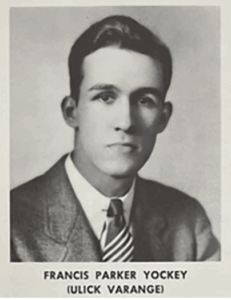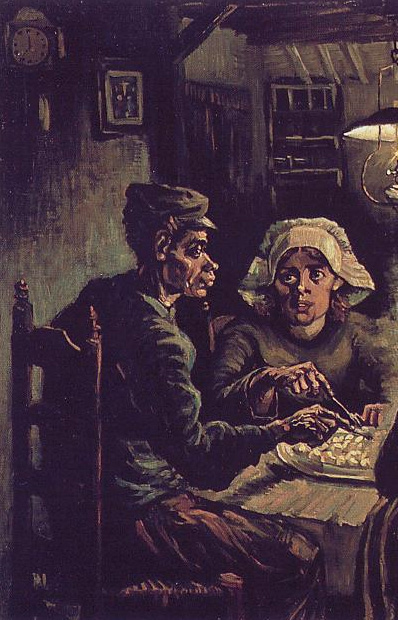by Michael O’Meara
O’Meara’s essay shows beautifully why we believe that the relations between Americans and Germans lie at the deepest level of the rabbit hole to understand the West’s darkest hour.
______ 卐 ______
The “Judeo-African cacophony” mesmerizing the jitterbugs on the dance floors of the Thirties was part of a larger program to debauch the conservative Christian rhythms of American life. Such at least was the argument Francis Parker Yockey made in his first published work, “The Tragedy of Youth” (1939).

In this early piece, full of promise and prefiguring aspects of his later critique of American life, the 22-year-old Yockey depicted an America whose youth had begun to keep step with the intonations and inflections of its Jewish bandmasters. Besides the folly of their un-European cavorting, Americans, he thought, were acting out the worldview of an alien-minded minority in control of the country’s media and entertainment. Drinking, smoking, and other bad habits glamorized by Hollywood became, in this spirit, marks of sophistication; sports were fetishized; public opinion was shaped and reshaped to legitimate machinations of every sort.
More seriously, God was “replaced by lust, the priest by the psychoanalyst, and the hero and heroine by the promiscuous lounge-lizard and the glittering harlot.” For the more educated, there were books and magazines promoting class war, racial equality, and anti-European (especially anti-German) hatred—aimed at destroying “whatever exclusiveness, national feeling, or racial instinct” still part of the American people.
Institutionalizing these subversions, Roosevelt’s New Deal, the granddaddy of the present anti-white system, took on debts and obligations favoring the Left forces—themselves puppets of the international financiers and bankers responsible for the deception and dissimulation entrancing the jitterbugs.
Against this backdrop of cultural distortion, usurious state policy, and agitations favoring causes alien to American affairs, the country’s youth, Yockey claimed, was being conditioned to fight as conscripts in liberal, Jewish, and Communist causes inimical to their national interest.
The True America
Basic to Yockey’s understanding of America was his belief that it was, at root, an integral and organic part of Europe. Whenever he spoke of “the true America,” as opposed to the America that had been taken over by the “culture distorters” and become “the enemy of Europe,” it was the America that had originated as a European colony—the America whose “culture” was a branch of Europe’s High Culture—the America whose people still bore traces of the noble, heroic, and Gothic character of their ancestors.
“All colonials,” Yockey felt, “have a certain plane of their being which is susceptible to the centripetal attraction of the mother-soil.” For they share a common history with “the parent-organism”—no matter how much the distorters might insist otherwise. The true American—i.e., the American whose highest loyalty was to his “mother soil and father culture”—thus instinctively isolated himself from all efforts to betray Europe: like French Canadians and South African Boers who refused to be conscripted by Washington in the Jews’ war against the Third Reich.
A child of European, especially German, culture, Yockey alone among American anti-liberals saw that America’s origin had tied its destiny to that of Europe, and that no matter how many cities the colony built, no matter how many millions of automobiles it turned out every season—no matter, even, how successful it was in reducing Europe to rubble and occupying it—no matter, it (the colony) would never, not in a thousand years, surpass the achievement and destiny of its mother soil and father culture.
To even think it was philosophically absurd.
The Culture of Distortion
Given their shallow culture and the dismissal of the tradition to which they were heirs, Americans were particularly vulnerable to the corrosions of 19th-century rationalism and materialism. Relatedly, they were an easy mark for “culture aliens”—for a world governed by money was a world indifferent to a man’s qualities. Foremost among the culture-aliens were the Jews: product of Spengler’s “Magian” culture, instinctually hostile to the European spirit, and bent on revenge.
In their counting houses, Americans would invariably overlook the Jews’ otherness, though they were of a different “Culture-Nation-Race.” Even before the War of Independence, they treated Jews as Europeans—Jews who had been shunned, ghettoized, and seen by most Europeans as an evil to be avoided.
Beginning in the 1880s, the Jews (these inassimilable aliens rejected by Europe’s High Culture) began their invasion of America. By 1905, they were already a power, evident in fact that the United States, for the first time in its history, severed diplomatic relations with Russia on account of the “anti-Jewish pogroms” that had followed the Russo-Japanese War.
Through its financial acumen and early control of media (the press, movies, radio), and in alliance with the native forces of decadence and degeneration, Jewish power in the New World grew at an unprecedented rate.
In a country where “mass-thinking, mass-ideals, and mass-living prevails,” Jewish propaganda (in the form of advertising, fashion, and a hundred other things) effortlessly reshaped the American consciousness, propelling the jitterbugs onto the dance floor of their world-conquering schemes. Stories of German sadism or Orson Wells’ Mars invasion were peddled with similar success, just as “the ethical syphilis of Hollywood and the spiritual leprosy of New York” infiltrated the larger cultural body.
In 1933, the year of the European Revolution, the Jews acquired outright political control of the United States—something that a thousand years of effort had failed to achieve in Europe.
From this point forward, “the formation of the Jewish-American Symbiosis begins.” Swarming into Washington, Jews and their “sub-American” contractors started dissimulating the Jewish world view and “bringing under control every factor of public expression.”
All who resisted were to be purged or ostracized.
Then, as the country’s racial instincts were worn down by the distorters, America (in accord with the policies of its liberal state and in the programming of its Culture Industry) assumed “a Jewish countenance” in its relations both with the rest of the world and with itself.
For Yockey, Franklin Roosevelt, “the monster who made of his life a study in infamy,” was a creature of the Jews, just as his New Deal was bent on Judaifying American government and society, promoting, as it did, principles of tolerance and universal brotherhood, which were further developed by Rockefeller-funded social-engineers intent on morally disarming the American people.
In this, the prescient Yockey might be criticized for confusing Jewish supremacy with the increasing Judaification of American society (which Matthew Arnold had warned of in the 1860s), for Jewish power in America was arguably not consolidated until the late 1960s (even if its secular low-church market, in making money the ultimate standard, had already Judaicized American life and sentiments).
That Roosevelt, in October 1937, began to maneuver the United States into the coming world war and that this war would be a war of annihilation—i.e., the sort of war fought between racially and culturally alien, rather then related peoples sharing the same civilization—was further evidence, in Yockey’s eyes, of Jewish hegemony and the Jews’ genocidal hatred of Europe.
Despite a certain exaggeration of Jewish power in this period, Yockey was nearly alone in seeing that the United States had become an anti-European power bound to the Jews’ vengeful compulsion to suppress Europe’s destiny.
Unlike other American anti-liberals, anti-Semitism for him evolved, rapidly and logically, into an anti-Americanism.
The Enemy of Europe
As long as America had been ruled by men of European Christian stock, it remained “a European colony.” But the America “distorted by the Revolution of 1933” (a revolution carried out by the allegedly Jewish-dominated New Deal), was now lost to Europe.
America’s Jewified anti-Europeanism was especially evident in the Second World War and in its subsequent occupation of the Continent. For if the United States had possessed a proper ruling class, a tradition, and a regalian state, it would have stayed out of the Second World War, which became a defeat not just for Germany, but for all Europe—and thus, ultimately, a defeat for the true America.
Under its new Jewish-American regime, Washington after 1933 was instrumental in preparing the way for another European civil war—a war it would wage as if the enemy (their European kinsmen) weren’t human. Instead of being the great moral crusade against the absolute evil of fascism, the war in actuality represented a giant step toward the Judeo-plutocratic inauguration of a New World Order, based on American open markets and American economic practices.
To this end, American bombers (supported by their British vassals) reduced every German city to a heap of rubble, intentionally targeting heavily populated working-class residences—that is, “homes and families”; cities in France, Belgium, Holland, Italy, and Eastern Europe were also bombed, adding further hundreds of thousands of civilian casualties to US “kills”; American fighter-pilots similarly sought out civilians to machine-gun and terrorize; vast stores of equipment and armaments, often denied to American troops, were supplied to Soviet Russia to defend the Communist state and encourage its penetration into the heart of Europe; and throughout this most barbaric and punitive war in the white man’s history, the Washington regime talked incessantly of the enemy’s “war crimes” and its “inhumanity.”
Yockey blamed America’s dishonorable conduct in the war on the culture-distorters, whose “motivation derived from the deep and total organic irreconcilability between a High Culture and a parasitic organism” (though I suspect that the country’s latter-day Puritans, given their tendency to dehumanize the enemy, ought also to share a large part of the responsibility).
Even after the guns were silenced, America’s “ghastly dishonor” continued. With the Red Army occupying Eastern Europe and the US Army Western Europe, the looting, raping, pillaging—and ethnic cleansing—began.
The Soviets plundered everything not bolted down; the greatest mass rape in Western history occurred in what became “East Germany”; and 16 million East-European Germans were forced to abandon lands and homes they had inhabited for centuries, two million of whom (mainly the very old and the very young) perished in the process.
With greater discrimination, the Americans raided German patent offices, steeling their superior technology; they rounded up their rocket scientists, confiscated the libraries they hadn’t burned, and made off with priceless art works. German women, most on the verge of starvation, were not subject to mass rape (except by black American and French African troops), but their favors could be had for a half-dozen eggs, some cigarettes, or a few chocolate bars.
If this weren’t enough, the culture-distorters (whose “fury had been heightened by the European Revolution of 1933”), along with their American accomplices (especially the budding military-industrial complex), introduced large-scale starvation, abused POWs (several million of whom died as a consequence), hunted down anyone who failed to bow to the new conquerors, and imposed laws with ex post facto application.
Adding insult to injury, the “American world-clown and the sadistic Jew” then endeavored to “re-educate” Europeans in the arts of anti-fascism, mammon-worship, and democracy (i.e., “the corruptibility of the government by private wealth”).
The war for Yockey represented a categorical defeat for the “true America”—and a total victory for the Jews over Western Civilization.
Since 1945, the two sides of the Atlantic have ceased to share the same inner experience of feeling, for it was essentially a war against Europe. European Americans who supported it, Yockey contended, were traitors—inner enemies of their own culture.
Then, after being reduced to “a beggar colony of America,” Europe’s pre-1945 elites were replaced by “Michel elements” (liberal philistines embodying “the sum of European weaknesses”), who could be trusted to do the Jews’ bidding.
In the name of democracy, press rights and free speech were henceforth abrogated; political parties were required to obtain licenses; any expression of nationalism was criminalized, just as all anti-liberal formations critical of the occupiers’ regime were driven to the political fringe.
America-Jewry in this way sought to sever Europe’s roots, suppress her will to power, and deprive her of a sense of destiny.
In no meaningful political sense did Europe, in fact, continue to exist after 1945, thanks almost entirely to this monstrous entity with the Jewish head and the American body.
America-Jewry’s anti-European vengeance was especially evident in comparison to its generous treatment of defeated Japan.
Indeed, the entire nonwhite world was soon made to know that the United States had conquered Europe and that the colored outer-revolt, encouraged by the distorters, was ready, at last, to triumph over its former white masters. More than Soviet Communism, Yockey argued that Jewish-controlled America was the “enemy of Europe.”
And this made America an enemy of “true America,” for the Jewish idea of America—as a land of immigrants, creedal propositions, and universal brotherhood—stripped it of any “national-spiritual significance” it may have once had, doing so, ultimately, for “the enslavement of the world by big business.”
Every European-American loyal to his ancestral homeland—loyal to his own inmost being—was, Yockey concluded, duty bound to be disloyal to what America had become (even as he struggled to return it to Europe).
The American Vabanquespieler
Yockey believed the 19th-century Age of Materialism and Rationalism, which had shaped America’s cultureless civilization and opened the way to the culture-distorters, came to an end with the First World War (1918), as a new age struggled to succeed it—a new age that would be animated by the same primordial sources that had brought about the European Revolution of 1933.
If not for America-Jewry’s Old Testament war on Europe, German-Prussian Ethical Socialism (in rejection of liberalism’s individualistic Reign of Quantity) would have inaugurated a New Age of Authority, Discipline, and Faith, bringing the whole world under Europe’s influence. Instead, the very opposite occurred.
But even though the America of the culture-distorters had emerged victorious from the war, it changed not in the least the fact that America (this apotheosis of the 19th-century rationalism and materialism born of liberalism) still represented the past—and the past, Yockey held, could never defeat the future latent in Europe’s High Culture.
The barbarian victory of America’s 19th-century capitalism over the Germans’ Ethical Socialism had, indeed, already spread chaos and disorder throughout Western Civilization, heightening the imperative for a revolutionary transformation.
* * *
For the Vabanquespieler, the creation of a new European order (in the form of a continental imperium stretching “from Galway to the Urals”) would entail a great, heroic undertaking, as the White men of the West—in allegiance to a new transcendent idea—rallied to overthrow an exhausted, putrefied, but nearly insurmountable Jewish-American system.
The Last Men of America’s consumer paradise may think that the barbarians and the distorters had tamed the forces of history and quieted the demands of destiny, but the American apostate knew better. He also knew that Americans could do better.
Thus inspired, the Vabanquespieler stood against the Jewish- dominated, liberal-capitalist, anti-European Mammon System that had become America.
In anticipating the next cycle of Western Destiny, Yockey’s life work has bequeathed to European Americans a legacy affirming that “the old Gothic religious idea” is still latent in them and that the 21st century will be an age of European peace and order, if they are willing to fight for it.
The “American ideology” may therefore have no future, but “the soul of the American people,” born of Europe, has.
______ 卐 ______
Editor’s note:
The above piece has been excerpted from Michael O’Meara’s “The Jitterbugs & the Vabanquespieler: On Yockey’s America” (The Occidental Quarterly, Winter, 2010-2011).





